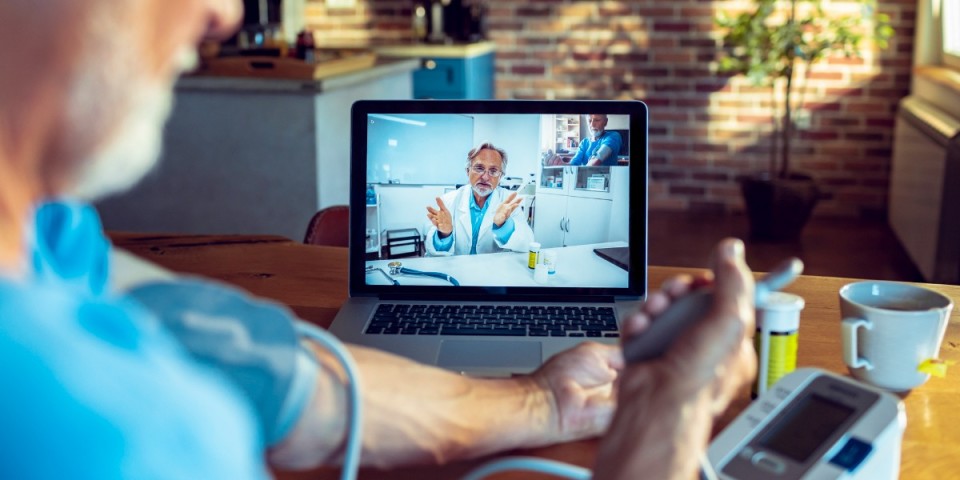The 5 digital health technologies that will change the way you see the GP
By Bruntwood SciTech

With the NHS still recovering from the overwhelming pressures of COVID-19, the healthcare sector needs to find new ways to see and treat the backlog of patients that’s built up over the last two years.
And that’s where digital health technologies can show their value. From conducting appointments via video conferencing tech to transferring medical histories online, digital health solutions are set to change the landscape of healthcare delivery and quicken a return to a normal post-pandemic life.
Continue reading, below, for more information on the most exciting digital healthcare innovations.
What is digital health?
Before we jump into the exciting technological examples, let’s start by first tackling the definition of digital health itself.
Digital health is the health sector innovating and improving medicine and the efficiency of healthcare through the use of modern technology. This could be as simple as introducing an online booking system to better organise appointments at GP practices or as complex as developing virtual reality technology to train young surgeons.
See below, to find out our five picks of digital health technology that will change the way you see your GP.
1. Telehealth tech
Telehealth is the use of digital communication technologies, such as mobiles, laptops or tablets, to diagnose and treat healthcare patients.
One of the most prevalent examples of telehealth is GP practices using video conferencing technology to conduct appointments. Patients can show or describe any worrying symptoms by using their phone or computer and the healthcare professional can then decide whether follow up appointments or referrals are required.
Of course, telehealth tech will not outright replace face-to-face appointments, but they can ease the pressure on practices and surgeries by offering a quick and easy way for non-emergency conditions to be checked over.
2. Wearable digital medical devices
We’re all familiar with wearable technologies, such as Fitbits and smartwatches, but did you know these devices could be vital to the future of digital healthcare?
That’s right, they’re designed to collect user data concerning personal health and exercise stats – which can then be monitored by GPs in real time for fluctuations or potential problems.
There are also more bespoke digital medical devices, such as blood pressure monitors and ECG monitors, that reduce the need for in-person appointments as your GP automatically collects that vital data.
3. Digital health apps for mental health
Appointments with your GP are not just for physical ailments, many people also want to talk to their doctor about mental health concerns, such as stress, depression and anxiety.
Digital health apps strive to help curb that demand, as well as provide an opportunity for people to seek help who may not have the confidence to go see a GP in-person. Take 7 Cups, for instance, which offers free chat 24/7 with one of 160,000 trained listeners and licensed therapists online.
There are also digital health apps that seek to address the cause of any mental health symptoms, such as Pzizz. This helpful tool uses clinical data to create a soundscape, designed to induce a good night’s sleep.
4. Digital health information
Historically, patient records have been kept as physical records. Yet, this method takes up valuable space in GP practices and offices, while also risking being lost, stolen or damaged.
Digitising patient records, however, not only safeguards valuable medical history but also reduces the time spent searching and retrieving that information. With this type of digital health technology, practices can bring up your medical information at the touch of a button, increasing efficiency and your GP’s ability to better service your needs.
5. Virtual and augmented reality
While typically associated with video games, both virtual and augmented reality technology have really exciting applications in the future of digital healthcare.
With virtual reality, for example, your GP can walk you through complicated procedures via state-of-the-art headsets, assuaging any worries or concerns. This digital health technology could also be useful for young doctors and surgeons who can practice new procedures with more freedom.
Virtual and augmented reality tech can have mental health benefits, too. An agoraphobic patient, for instance, can use these digital medical devices to face real life scenarios that cause discomfort and alleviate any fears.
Work in the digital health technology sector and want to find out more about the flexible office and lab space available and links to industry connections to match your ambition? Head over to Bruntwood SciTech to find out more and find your local Bruntwood SciTech location here.